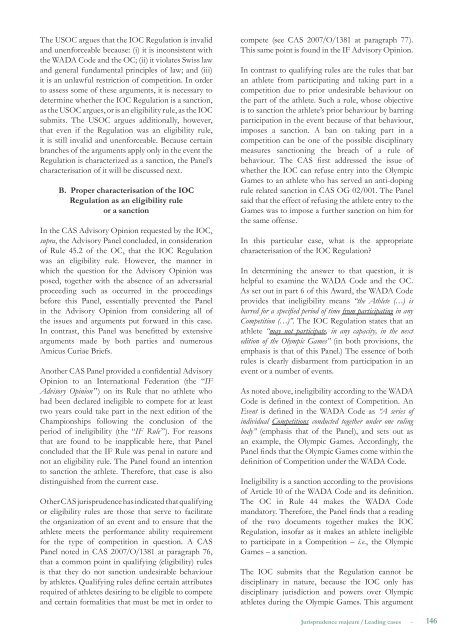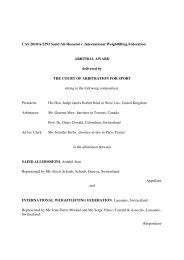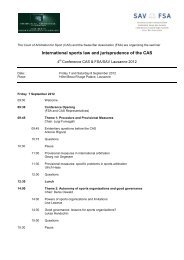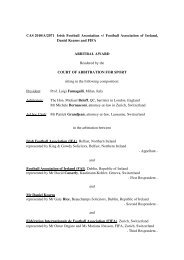(CAS) Bulletin - Tribunal Arbitral du Sport / TAS
(CAS) Bulletin - Tribunal Arbitral du Sport / TAS
(CAS) Bulletin - Tribunal Arbitral du Sport / TAS
You also want an ePaper? Increase the reach of your titles
YUMPU automatically turns print PDFs into web optimized ePapers that Google loves.
The USOC argues that the IOC Regulation is invalid<br />
and unenforceable because: (i) it is inconsistent with<br />
the WADA Code and the OC; (ii) it violates Swiss law<br />
and general fundamental principles of law; and (iii)<br />
it is an unlawful restriction of competition. In order<br />
to assess some of these arguments, it is necessary to<br />
determine whether the IOC Regulation is a sanction,<br />
as the USOC argues, or is an eligibility rule, as the IOC<br />
submits. The USOC argues additionally, however,<br />
that even if the Regulation was an eligibility rule,<br />
it is still invalid and unenforceable. Because certain<br />
branches of the arguments apply only in the event the<br />
Regulation is characterized as a sanction, the Panel’s<br />
characterisation of it will be discussed next.<br />
B. Proper characterisation of the IOC<br />
Regulation as an eligibility rule<br />
or a sanction<br />
In the <strong>CAS</strong> Advisory Opinion requested by the IOC,<br />
supra, the Advisory Panel concluded, in consideration<br />
of Rule 45.2 of the OC, that the IOC Regulation<br />
was an eligibility rule. However, the manner in<br />
which the question for the Advisory Opinion was<br />
posed, together with the absence of an adversarial<br />
proceeding such as occurred in the proceedings<br />
before this Panel, essentially prevented the Panel<br />
in the Advisory Opinion from considering all of<br />
the issues and arguments put forward in this case.<br />
In contrast, this Panel was benefi tted by extensive<br />
arguments made by both parties and numerous<br />
Amicus Curiae Briefs.<br />
Another <strong>CAS</strong> Panel provided a confi dential Advisory<br />
Opinion to an International Federation (the “IF<br />
Advisory Opinion ”) on its Rule that no athlete who<br />
had been declared ineligible to compete for at least<br />
two years could take part in the next edition of the<br />
Championships following the conclusion of the<br />
period of ineligibility (the “IF Rule ”). For reasons<br />
that are found to be inapplicable here, that Panel<br />
concluded that the IF Rule was penal in nature and<br />
not an eligibility rule. The Panel found an intention<br />
to sanction the athlete. Therefore, that case is also<br />
distinguished from the current case.<br />
Other <strong>CAS</strong> jurisprudence has indicated that qualifying<br />
or eligibility rules are those that serve to facilitate<br />
the organization of an event and to ensure that the<br />
athlete meets the performance ability requirement<br />
for the type of competition in question. A <strong>CAS</strong><br />
Panel noted in <strong>CAS</strong> 2007/O/1381 at paragraph 76,<br />
that a common point in qualifying (eligibility) rules<br />
is that they do not sanction undesirable behaviour<br />
by athletes. Qualifying rules defi ne certain attributes<br />
required of athletes desiring to be eligible to compete<br />
and certain formalities that must be met in order to<br />
compete (see <strong>CAS</strong> 2007/O/1381 at paragraph 77).<br />
This same point is found in the IF Advisory Opinion.<br />
In contrast to qualifying rules are the rules that bar<br />
an athlete from participating and taking part in a<br />
competition <strong>du</strong>e to prior undesirable behaviour on<br />
the part of the athlete. Such a rule, whose objective<br />
is to sanction the athlete’s prior behaviour by barring<br />
participation in the event because of that behaviour,<br />
imposes a sanction. A ban on taking part in a<br />
competition can be one of the possible disciplinary<br />
measures sanctioning the breach of a rule of<br />
behaviour. The <strong>CAS</strong> fi rst addressed the issue of<br />
whether the IOC can refuse entry into the Olympic<br />
Games to an athlete who has served an anti-doping<br />
rule related sanction in <strong>CAS</strong> OG 02/001. The Panel<br />
said that the effect of refusing the athlete entry to the<br />
Games was to impose a further sanction on him for<br />
the same offense.<br />
In this particular case, what is the appropriate<br />
characterisation of the IOC Regulation?<br />
In determining the answer to that question, it is<br />
helpful to examine the WADA Code and the OC.<br />
As set out in part 6 of this Award, the WADA Code<br />
provides that ineligibility means “the Athlete (…) is<br />
barred for a specifi ed period of time from participating in any<br />
Competition (…)”. The IOC Regulation states that an<br />
athlete “may not participate, in any capacity, in the next<br />
edition of the Olympic Games” (in both provisions, the<br />
emphasis is that of this Panel.) The essence of both<br />
rules is clearly disbarment from participation in an<br />
event or a number of events.<br />
As noted above, ineligibility according to the WADA<br />
Code is defi ned in the context of Competition. An<br />
Event is defi ned in the WADA Code as “A series of<br />
indivi<strong>du</strong>al Competitions con<strong>du</strong>cted together under one ruling<br />
body” (emphasis that of the Panel), and sets out as<br />
an example, the Olympic Games. Accordingly, the<br />
Panel fi nds that the Olympic Games come within the<br />
defi nition of Competition under the WADA Code.<br />
Ineligibility is a sanction according to the provisions<br />
of Article 10 of the WADA Code and its defi nition.<br />
The OC in Rule 44 makes the WADA Code<br />
mandatory. Therefore, the Panel fi nds that a reading<br />
of the two documents together makes the IOC<br />
Regulation, insofar as it makes an athlete ineligible<br />
to participate in a Competition – i.e., the Olympic<br />
Games – a sanction.<br />
The IOC submits that the Regulation cannot be<br />
disciplinary in nature, because the IOC only has<br />
disciplinary jurisdiction and powers over Olympic<br />
athletes <strong>du</strong>ring the Olympic Games. This argument<br />
Jurisprudence majeure / Leading cases<br />
-<br />
146





